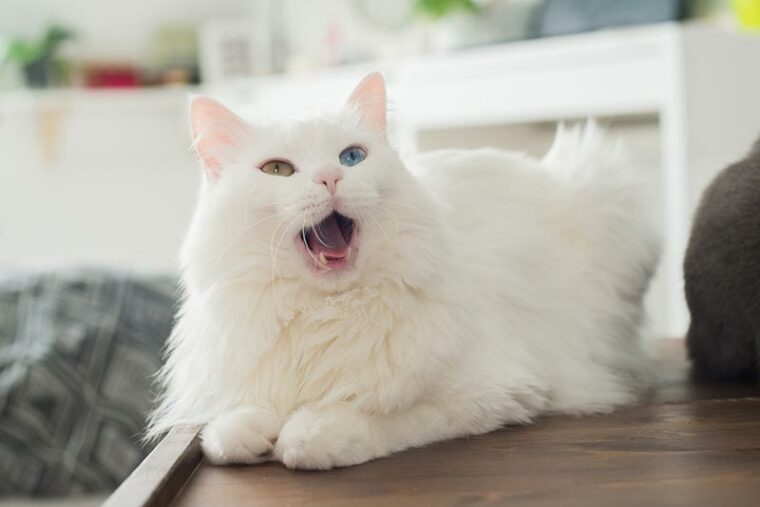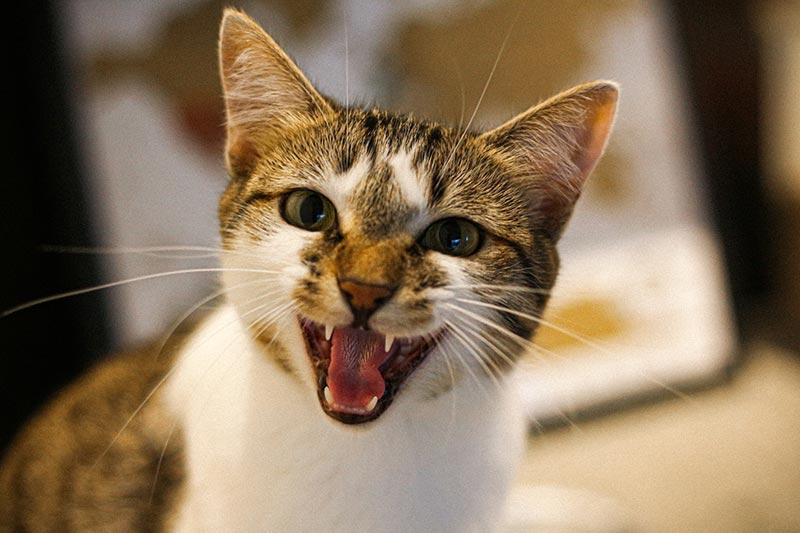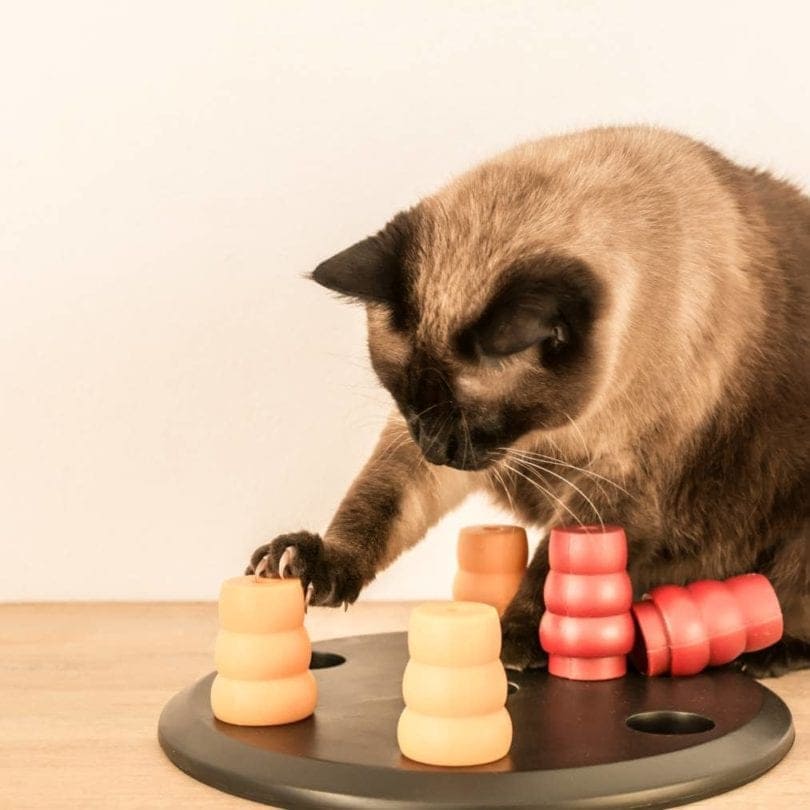
Click to Skip Ahead
Meowing is something that all cats do — this is normal communication behavior. But although all cats meow (to some extent) to humans, they will rarely meow to each other. Indeed, meowing is their way of letting you know that they need something, be it food or attention, that they’re trapped somewhere, or that they want to go out and explore the backyard.
However, cats can also meow when they are in distress or in real pain. Knowing the different reasons that cats meow and paying close attention to your own kitty’s meowing habits is essential to understanding what they are trying to communicate to you, so you can respond properly to their needs.
The 4 Reasons Why Cats Meow
Before we delve into the most common reasons that cats meow, keep in mind that every cat is different. What is considered a “normal” meow for the owner of a talkative cat could be a sign of an underlying health issue for another cat. If your four-legged friend is normally rather quiet but suddenly starts meowing constantly and for no apparent reason, you need to pay more attention to their behavior. Conversely, if your cat is normally more vocal and suddenly becomes quieter, there may be something wrong.
All that said, here are the most common reasons that your cat may meow at you.
1. To greet you!
Your little domestic feline is happy to have you back home, even if they may not show it as enthusiastically as a dog does! This greeting meow is often short and high-pitched and demonstrates your kitty’s contentment and interest.

2. To ask for your attention
A mid-pitch meow is your cat’s way of asking for your attention. This type of meow can be accompanied by little head or paw thumps and indicates that your feline friend wants to be petted or played with. Some cats are more vocal when demanding your attention; cats that have been alone all day are also more likely to “talk” to you when you come home.
3. To let you know that it’s lunchtime
Most cat owners are familiar with the insistent meowing of a kitty demanding that their meal be served immediately. Vocal cats aren’t shy about letting you know that they’re hungry, even if it’s 7 a.m.!

4. Because they want to go out or come in
A drawn-out “mrroww” is another type of meow that your cat makes when they want to go out or enter the house. Moreover, cats that are used to going outside may bombard you with incessant meowing if you leave them inside for too long.
5. Because there is something wrong
Cats in pain often have loud or high-pitched meows. However, cats that are in distress or suffering from some illness will not always vocalize their pain. So, pay close attention to your cat’s body language if they suddenly become quieter. For example, sleeping more than usual and loss of appetite are other signs of an underlying health condition. Additionally, older cats with dementia (also known as cognitive dysfunction syndrome) may meow excessively.
In short, although all cats meow, it does not always mean the same thing. By paying attention to the tone, pitch, and volume of your cat’s vocalizations, you should be able to decipher what they want.
How to Stop Constant Meowing
Meowing is a natural behavior for cats, and it’s nearly impossible to stop it completely. However, you can take a few steps to reduce the amount of meowing that your cat does:
- Feed your cat on a regular schedule. Cats are vocal when they’re hungry, especially kittens. If you feed your cat on a regular schedule, they’ll be less likely to meow just because they’re hungry.
- Provide plenty of enrichment. Cats crave stimulation and mental exercise, so make sure you have many toys for them to play with. Also, cats that are kept indoors may be bored, and they might meow because they’re frustrated and looking for attention.
- Make sure your cat has somewhere quiet to sleep. Cats love to nap, and a nice quiet space where they can rest may reduce their anxiety and desire to meow excessively.
In any case, ignoring your cat when they meow is not a solution. If your cat starts constantly meowing, first check to see if they have access to fresh water, food, and clean litter or if they are injured.
If your kitty continues to meow and you’ve tried everything to make them quiet down, it’s best to visit the vet. They’ll be able to examine your pet for any health issues.

Frequently Asked Questions
Do Cats Meow at Each Other?
Cats rarely meow to each other —they use other means of communication, such as yowling, hissing, and growling. Kittens meow to their mothers while nursing, and they will continue to meow to humans when they are older.
What Is Considered Excessive Meowing?
It depends on the cat: Their breed, personality, age, and overall health will play a role in the number and intensity of their vocalizations. For example, Siamese cats tend to be much more talkative than other breeds. Also, if your cat is normally calm and suddenly starts meowing for no obvious reason, you should have them checked out to make sure there are no underlying problems. Common health issues that could cause your cat to meow excessively include diabetes, hyperthyroidism, hypertension, kidney disease, and digestive issues.
There are also behavioral reasons for constant meowing, although these are less serious. Cats may meow out of boredom, loneliness, or frustration. They may meow because they want attention or to go outside. Furthermore, if you’ve recently adopted your cat or brought a new pet into your home, the constant meowing may be a sign of anxiety.
In summary, every cat is different, and you know your pet’s meowing habits best.
Final Thoughts
Cats use many different forms of communication, including vocalizations and body language. When cats meow, they are trying to tell you something, whether it’s that they’re happy to see you, that they’re hungry, that they want to be let in or out of somewhere, or that they’re in pain. In fact, there are many reasons that a cat might meow constantly, but the best thing to do is to pay attention to your pet’s meowing habits and act accordingly.
While all cats meow to a certain degree, the tone, pitch, and volume will vary depending on each cat’s personality, breed, age, and overall health.
Featured Image Credit: Helen Bloom, Shutterstock








